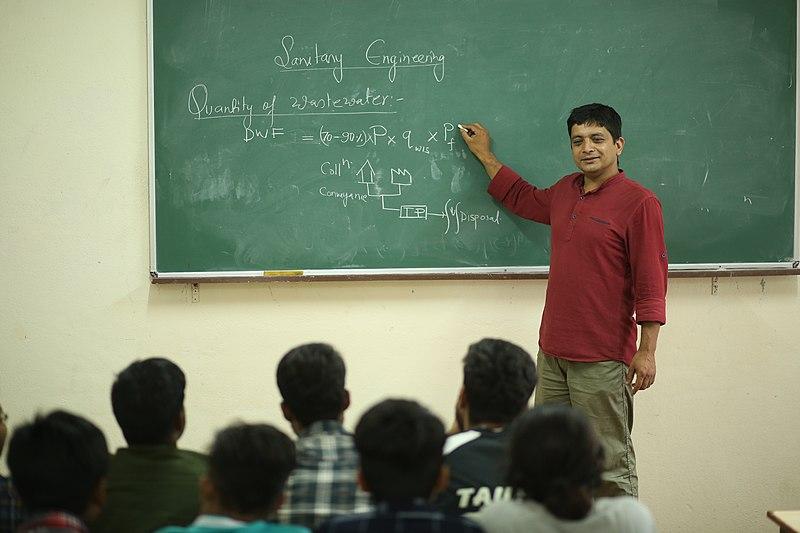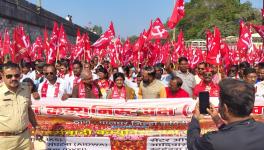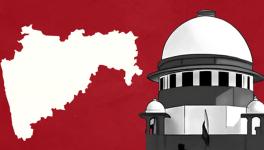Is Union Govt. Doing Enough to Address the Low Percentage of ST Teachers in Universities?

Representational Image. Image Courtesy: Wikimedia Commons
Higher education for scheduled tribes (ST) students and their representation in it is one of the major indicators of the development of tribal students as well as for their communities in Indian society. Therefore, reservation and representation of tribal students are not only constitutional mandates but also essential for the acceleration of creativity and critical knowledge production in Indian academia.
However, with deeply rooted casteism and racism in all spheres of the Indian society, the privileged upper-caste seem to be oblivious to the fact of how crucial these reservation and affirmative policies are for primary access to opportunities like access to higher education and the Job market for the historically discriminated and subjugated communities like scheduled castes (SC), ST, etc.
This obliviousness of the upper caste and privileged individuals toward the plight of the SC-ST communities becomes obvious by comments made by personalities in socially influential positions. For example, in Nov 2021, WION journalist Palki Sharma released a report titled "Should India revisit the relevance of reservation?".
In the report, she questioned the necessity of reservation and argued that these affirmative actions to address historical injustice against the SC-ST and others have become obsolete. Despite being influential media personnel, she was ignorant about the existing systemic everyday discrimination of SC-ST students' and scholars' experience over their socio-cultural roots, along with historical financial struggle and inequality - leading to the dire requirement of reservations and financial boosts through schemes like scholarships.
Upon examining the reservation policies and their implementation in higher education in recent times in different influential educational institutions - The representation of SC-STs scholars in publicly funded premier higher educational institutes such as the Indian Institute of Management (IIM), Indian Institute of Technology (IIT), National Institute of Pharmaceutical Education and Research (NIPER), All India Institute of Medical Sciences (AIIMS) and other emerging private institutes like Ashoka University and Jindal University, etc., have been found deplorable.
The AISHE reports from the recent academic years have indicated a lower gross enrolment ratio (GER) from the tribal communities at all educational levels. If we examine the 2019-20 AISHE reports, the overall national average of GER is 27.1, while ST is 18.0. The total enrolment of ST students is at 5.6%, while their population constitutes 8.6% in India. Further, according to the constitutional mandate, the percentage of STs in university teaching positions should be 7.5 and above. But as per the 2019-20 AISHE report released by the Department of Higher Education of the Ministry of Education (MoE), Government of India (GoI), the percentage stands at 2.4.
A time when reservations should be applied to private institutes or not is a debate, not enough attention has been paid to ensuring the implementation of the existing reservation policies that are mandatory for all government institutes like IITs, IIMs, NIPER, AIIMS, etc. However, data shows a serious violation in implementing these existing reservation policies by the so-called premier institutes and universities.
To these institutes, "reservation kills merit." Here it is worth mentioning that the sole purpose of affirmative action is to ensure representation and diversity. However, these premier institutes make these reservation policies toothless by bringing the discourse of "merit" without acknowledging that merit comes with layers of social-economic privilege.
The data submitted to the parliament by the Ministry of Education, Government of India, shows the ever-lowering rate of student enrolments from SCs and STs to doctoral programs across 23 IITs in India. According to the constitutionally designated policy, the reservation percentage should be 15% for SCs and 7.5% for STs, respectively.
But the five years of data show that among the total admissions across all IITs between 2015 – 2019, only 2.1% and 9.1% of ST and SC students got in, respectively. Meanwhile, the rate of General Category applicants was a whopping 65.6% of the total admission, which is relatively higher in proportion to the population of the country.
To quantify, among 11,019 SC and 1,809 ST applicants, only 238 and 40 students got selected, respectively. Even in the newer IITs in Tirupati and Palakkad, the admission of ST students was nil in all departments. The number was only one in Bhilai, Goa and Dharwad in the academic year of 2020. In the academic year 2021, no ST students were admitted to IIT Tirupati, Mandi, Bhilai, and Goa.
This lack of representation of the scheduled tribes, adivasi at the doctoral level, led to looking into the National Fellowship for ST, previously known as the Rajiv Gandhi National Fellowship (RGNF) for the SC-ST. It was constituted by the University Grants Commission (UGC) to address the gap in ST representation in the academic and professional arena. Funded by the Ministry of Tribal Affairs (MoTA), it was started in the academic year 2005-06 with 667 slots for ST scholars. Till the academic year 2013-14, this fellowship was managed by the UGC. Later, in the academic year 2014-15, the RGNF was renamed the National Fellowship for the Scheduled Tribes (NFST), and the number of awards was increased to 750 from 667 by the new Bharatiya Janata Party (BJP) government.
When the program started in the first year, it was 667 and remained unchanged for a decade till its managerial responsibility was transferred to MoTA in the 2014-15 academic year. Even after MoTA took over the administration of the fellowship, the number increased barely to 750 from the previous 667, not even by 100.
Though the Congress government initiated the RGNF in 2005 under the Eleventh planning commission, and its successor BJP government merged it with MoTA, apparently with the objective of increasing the slot and effective administration of scholarships in the year 2014. That very token increase in the number of fellowships raises doubt about the commitment to ensure actual social justice to adivasi/tribal scholars in Higher Education and increasing their percentage in teaching positions. How does the number of fellowship awards remain at a constant low for more than a decade?
This shows the depth of systematic exclusion of mandated constitutional rights and the deliberate attempt to keep the tribals and the marginalised communities off the academic spaces. Ironically, this very group of exclusionary people like Sharma talk about 'mythical' merit in terms of student enrolment and faculty recruitment.
The MoTA (MoTA) was established in 1999 after the Ministry of Social Justice and Empowerment bifurcation to make holistic betterment of the Scheduled Tribes across the country in all-encompassing terms, including primary and higher education. But looking at the number of awardees for the National Fellowship Scheme for Higher Education for the ST scholars, the intention and effort of MoTA to the aforementioned development appears questionable.
MoTA has been managing the fellowship since 2014-15 while funding it since its initiation in 2005-06 under RGNF. The RTI reveals that the measures taken by MoTA to timely update the scheme have been very inadequate in terms of the number of fellowship awards compared to the increasing number of students in each academic year. This shows the MoTA is not concerned about the needs of the Tribal scholars to pursue doctoral education. Moreover, MoTA has a record of not utilising its allocated budget fully. Also, there are several loopholes in the policy implementation of the various schemes, such as the National Overseas Scholarship for ST, Scheduled Tribes Component, etc.
As it is evident from various analyses that despite having the intention of delivering social justice, at least on paper and to an extent in application or practicality, the ministry is failing to fully act on the development or welfare of the adivasi (STs) because of ambiguity in the implementation of the intended welfare schemes. For example, the MoTA budget for the financial year 2022-23 increased to Rs 8451.92 crore from the previous financial year when it was Rs 7524.87 crore. Despite the 12.32% raise in the total budget of the ministry, the allocation for the Post-Matric Scholarship for STs declined from Rs 1,993 crore to Rs 1,965 crore. The budget for the National Fellowship and Scholarship for Higher Education for ST students has been reduced to Rs 145 crore from the previous financial year's Rs 150 crore.
Given the increasing demand for all scholarship schemes under the MoTA from the students and scholars, when the MoTA and the GoI should increase the number of awards and budget in the context of global and local financial inflation, various reports show that the ministry has continued to fail to do so.
Therefore, MoTA should make remedial efforts. A review committee with more representations from adivasi academicians across the regions should be formed to monitor the fair allocation of scholarships regularly, review the existing scheme clauses, and timely update as per the demand of the scholars.
Again, as MoTA removed the state-wise ceiling after the merger in the academic year 2014-15, some states with comparatively better mobilisation to education and other opportunities might have more representation disproportionate to other lagging or poor states. Therefore, the state-wise ceiling should be reinstated.
Lastly, To improve the enrolment of ST scholars as students and teachers in the Universities as per the constitutionally mandated percentage, the GoI and the MoTA should increase the number of awards yearly as per the increasing applications from ST communities. In the case of schemes like the National Overseas Scholarship, National Fellowship, and Scholarship for Higher Education of ST students, the concerned departments should be prompt in releasing the call for scholarship and publication of awards in a regular, timely manner, in accordance with each national and international academic year to evade mental and financial struggles and bureaucratic complexities of the ST students who need the utter utilisation of the fellowship to pursue their higher education.
The writer is a postgraduate ST scholar from Telangana, pursuing a master's as a National Overseas Scholarship fellow at Erasmus University, Rotterdam. Currently, he is working as an RA for the National Campaign on Dalit Human Rights (NCDHR).
Get the latest reports & analysis with people's perspective on Protests, movements & deep analytical videos, discussions of the current affairs in your Telegram app. Subscribe to NewsClick's Telegram channel & get Real-Time updates on stories, as they get published on our website.
























